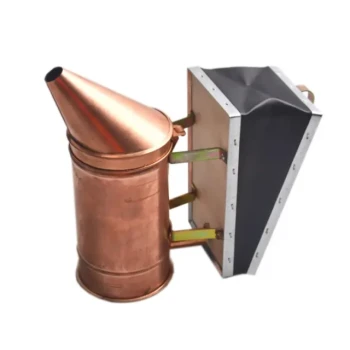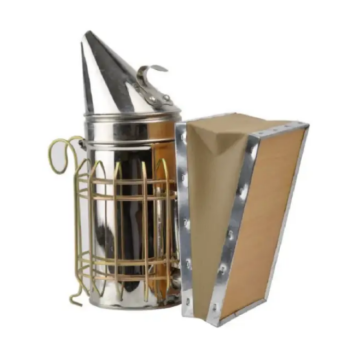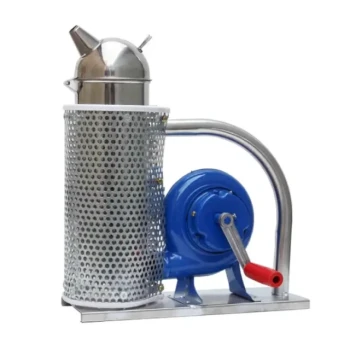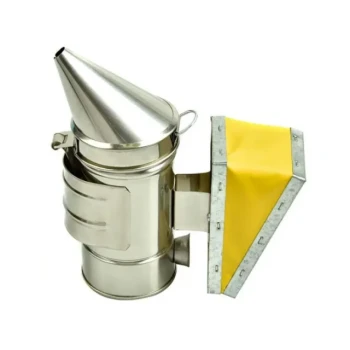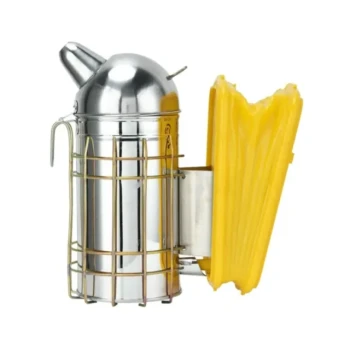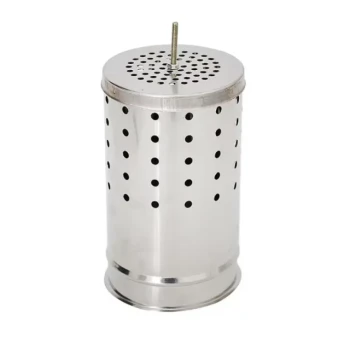To be precise, smoke intentionally disrupts bees rather than simply bothering them. When used correctly by a beekeeper, it triggers a specific set of survival instincts that make the colony calm and manageable. This disruption is temporary and, when done properly, is far less harmful to the bees than the alternative of a defensive, agitated hive.
While bees are certainly affected by smoke, the core purpose of a beekeeper's smoker is not to harm them but to hijack their communication and trigger a natural survival response, rendering them docile and less likely to sting.
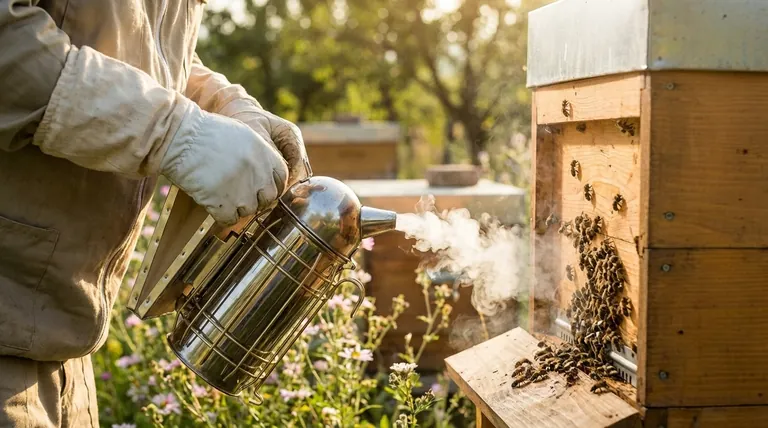
How Smoke Fundamentally Alters Bee Behavior
To understand the effect of smoke, you must first understand how a honeybee colony communicates. The entire process hinges on overriding their natural defensive instincts.
Interrupting the Alarm System
Guard bees protect the hive by releasing alarm pheromones when they perceive a threat. These chemical signals quickly alert the rest of the colony, putting thousands of bees on high alert and preparing them to attack.
Smoke effectively masks these pheromones. It scrambles the bees' primary method of communication, preventing a widespread panic or coordinated defensive response from being triggered.
Triggering a Primal Instinct
The scent of smoke signals a primal danger to bees: a forest fire. Their immediate instinct is not to fight the fire but to prepare for a potential evacuation of their home.
In preparation, the bees rush to open honey cells and begin engorging themselves. They consume as much honey as possible to carry the colony's energy reserves with them to a new location.
The Pacifying Effect of a Full Stomach
This honey-gorging has a crucial side effect. When a bee's abdomen is full of honey, it becomes physically difficult for her to bend it into the proper position to sting.
This combination of scrambled communication and physical limitation is what makes a smoked colony seem so calm and docile. Their focus has shifted entirely from defense to survival.
Understanding the Risks and Proper Use
While smoking is a standard beekeeping practice, its effectiveness depends entirely on correct application. Misuse can be counterproductive and harmful.
The Danger of Too Much Smoke
Applying excessive smoke can have the opposite of the intended effect. Instead of calming the bees, it can confuse and agitate the colony, leading to more erratic behavior. The goal is gentle disruption, not overwhelming force.
The Harm of Hot Smoke
The smoke itself must be cool and white. A beekeeper's smoker that is puffing out hot air or flames can easily burn and kill the bees. This is why smokers are lit and allowed to smolder properly before being used on a hive.
Long-Term Stress and Contamination
While brief, controlled smoking is not considered harmful, prolonged exposure to smoke from events like a bushfire can cause severe heat and smoke stress. A stressed colony can take months to recover and may eventually perish.
Additionally, excessive smoke can be absorbed by the beeswax in the hive, which can taint the flavor of the honey.
The Effect is Temporary
The impact of a beekeeper's smoker is short-lived. Once the smoke dissipates, the bees' sensitivity to pheromones returns within 10 to 20 minutes, and the colony's normal functions resume. They do not abandon the hive due to this brief and controlled exposure.
Making the Right Choice for Your Goal
Understanding why smoke is used allows you to assess its impact from different perspectives.
- If your primary focus is effective beekeeping: Use cool, white smoke in moderation, puffing it gently at the hive entrance and under the cover before an inspection.
- If your primary focus is bee welfare: Recognize that proper smoking is a management tool that prevents harm, as it reduces defensive stinging which is fatal for the bee.
- If your primary focus is understanding nature: View smoke as a fascinating exploitation of an ancient survival instinct, temporarily shifting a colony's priority from defense to self-preservation.
Ultimately, the careful use of smoke is a cornerstone of modern beekeeping that benefits both the beekeeper and the long-term health of the colony.
Summary Table:
| Effect of Smoke | Result for Bees | Benefit for Beekeeper |
|---|---|---|
| Masks alarm pheromones | Prevents coordinated defensive response | Safer hive inspections |
| Triggers fire response | Bees gorge on honey, making stinging difficult | Reduced risk of stings |
| Temporary disruption | Normal behavior resumes in 10-20 minutes | Minimal long-term impact on colony health |
Ensure your beekeeping operations are safe and efficient with professional-grade equipment from HONESTBEE. We supply durable smokers, protective gear, and essential apiary supplies designed for the demands of commercial beekeepers and distributors. Our wholesale-focused operations mean you get reliable equipment that supports both your productivity and the welfare of your colonies. Contact us today to discuss your needs and explore our product catalog!
Visual Guide
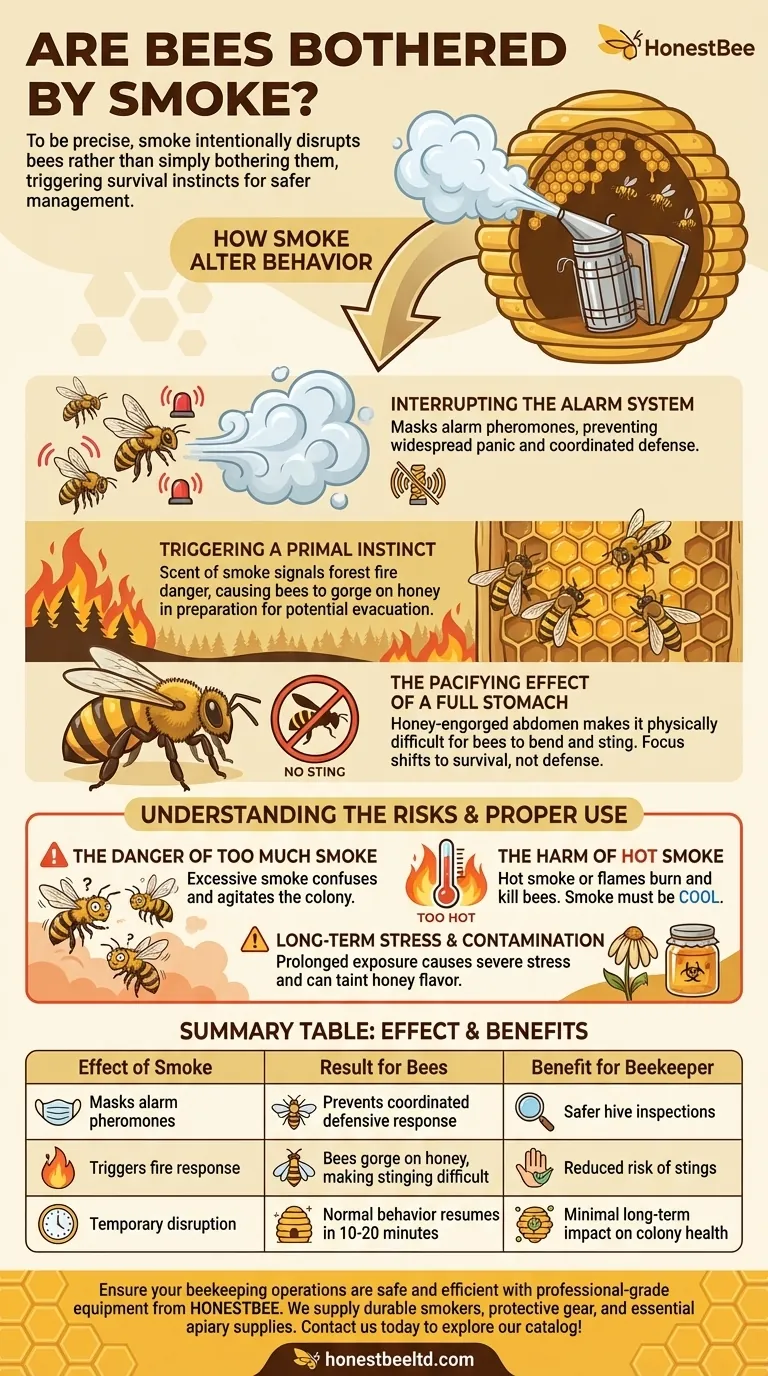
Related Products
- European Stainless Steel Bee Smoker for Honey Bee Hive
- Premium Traditional Copper Bee Smoker with Bellows
- Stainless Steel Honey Bee Smoker Hive and Honeycomb Smoker for Beekeeping
- Electric Bee Smoker European Style Bee Hive Smoker for Beekeeping
- Economy Galvanized Beekeeping Honey Bee Smoker for Wholesale
People Also Ask
- How do bee smokers work? A Guide to Calming Your Hive for Safer Inspections
- How can beekeepers reduce the likelihood of getting stung? Master Gentle Handling & Protective Gear
- Do bees hate the smell of smoke? The Truth About Beekeeping's Most Vital Tool
- Do bee smokers work? Unlock the Secret to Calm, Safe Hive Inspections
- What are bee smokers made out of? Choose the Right Material for Your Apiary

